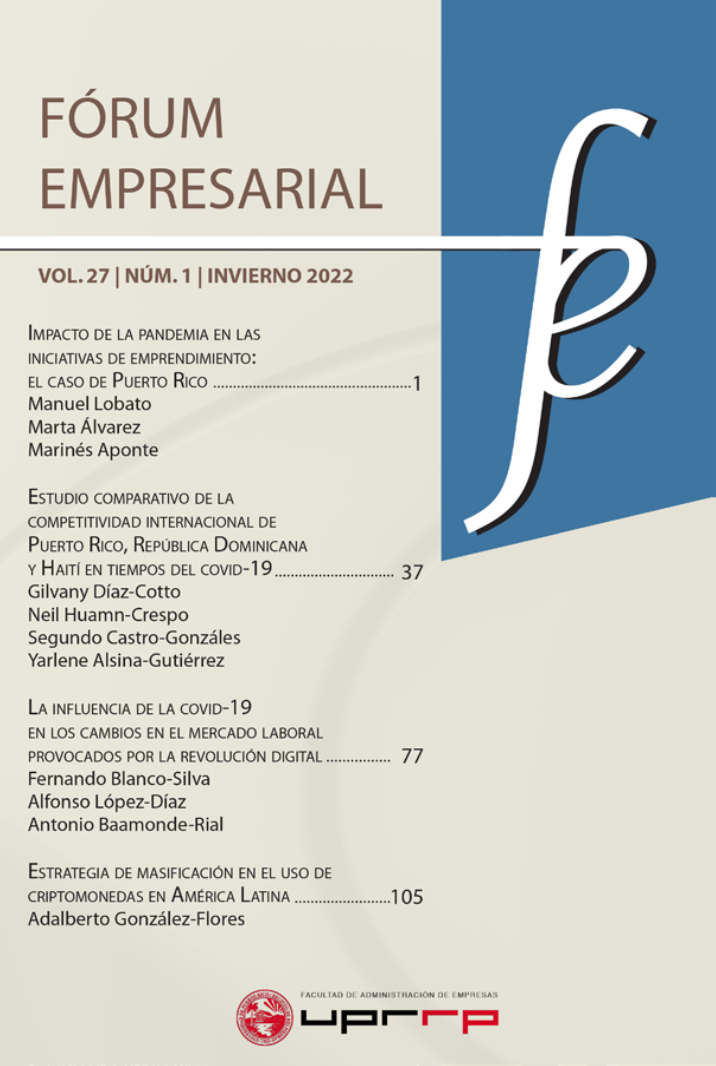Abstract
The covid-19 crisis has had a strong impact on entrepreneurship activity worldwide. This exploratory study analyzes the effects of the pandemic in an economy with a particularly low rate of entrepreneurial activity, Puerto Rico, using data from the Global Entrepreneurship Monitor (GEM). The impact here has been very pronounced, both in the indicators of new entrepreneurial activity and in those of business closures. Similarly, the new initiatives respond to a growth in identifying opportunities and a fall in household income. The conclusions point to issues that need to be addressed in future research, to understand if these changes are only circumstantial and the effect of specific public policy measures.
References
Álvarez, M., Aponte, M., & Lobato-Vico, M. (2018). Panorama de la actividad emprendedora en Puerto Rico. Universidad de Puerto Rico. http://dx.doi.org/10.13140/RG.2.2.25116.33924
Amorós, J. E., & Bosma, N. (2014). Global Entrepreneurship Monitor 2013 Global Report. GERA/GEM. https://www.gemconsortium.org/file/open?fileId=48772
Aponte, M., Álvarez, M., & Lobato-Vico, M. (2021). Informe de Puerto Rico GEM 2020. Universidad de Puerto Rico. https://www.researchgate.net/publication/354219478_Informe_GEM_Puerto_Rico_2020
Aubry, M., Bonnet, J., & Renou-Maissant, P. (2015). Entrepreneurship and the business cycle: the “Schumpeter” effect versus the “refugee” effect—a French appraisal based on regional data. The Annals of Regional Science, 54(1), 23–55. https://doi.org/10.1007/s00168-014-0645-x
Audretsch, D. B., & Acs, Z. J. (1994). New firm start-ups, technology, and macroeconomics fluctuations. Small Business Economics, 6, 439–449. https://doi.org/10.1007/BF01064858
Bailey, D., Clark, J., Colombelli, A., Corradini, C., De Propris, L., Derudder, B., Fratesi, U., Fritsch, M., Harrison, J., Hatfield, Lobato | Álvarez | Aponte M., Kemeny, T., Kogler, D. F., Lagendijk, A., Lawton, P., Ortega- Argilés, R., Iglesias Otero, C., & Usai, S. (2020). Regions in a time of pandemic. Regional Studies, 54(9), 1163–1174. https://doi.org/10.1080/00343404.2020.1798611
Bellavitis, C., Fisch, C., & McNaughton, R. B. (2021). COVID-19 and the global venture capital landscape. Small Business Economics, 59, 781–805. https://doi.org/10.1007/s11187-021-00547-9
Bosma, N., Hill, S., Ionescu-Somers, A., Kelley, D., Guerrero, M., & Shott, T. (2021). Global Entrepreneurship Monitor 2020/2021 Global Report. Global Entrepreneurship Research Association, London Business School. https://www.gemconsortium.org/file/open?fileId=50691
Buffington, C., Chapman, D., Dinlersoz, E., Foster, L., & Haltiwanger, J. (2021). High-frequency data from the US Census Bureau during the COVID-19 pandemic: small vs. new businesses. Business Economics, 56(3), 155–167. https://doi.org/10.1057/s11369-021-00229-0
Caballero, R. J., & Hammour, M. L. (1994). The cleansing effect of recessions. American Economic Review, 84(5), 1350–1368. http://www.jstor.org/stable/2117776
Caraballo-Cueto, J., & Lara, J. (2018). Deindustrialization and unsustainable debt in middle-income countries: the case of Puerto Rico. Journal of Globalization and Development, 8(2), 1–11. https://doi.org/10.1515/jgd-2017-0009
Congregado, E., Golpe, A. A., & Parker, S. C. (2012). The dynamics of entrepreneurship: hysteresis, business cycles and government policy. Empirical Economics, 43(3), 1239–1261. https://doi.org/10.1007/s00181-011-0516-6
Dinlersoz, E., Dunne, T., Haltiwanger, J. C., & Penciakova, V. (2021). Business formation: a tale of two recessions. AEA Papers and Proceedings, 111, 253–257. https://doi.org/10.1257/pandp.20211055
Ebersberger, B., & Kuckertz, A. (2021). Hop to it! The impact of organization type on innovation response time to the COVID-19 crisis. Journal of Business Research, 124, 126–135. https://doi.org/10.1016/j.jbusres.2020.11.051
Evans, D. S., & Leighton, L. S., (1990). Small business formation by unemployed and employed workers. Small Business Economics, 2, 319–330. https://doi.org/10.1007/BF00401628
Fairlie, R. W. (2013). Entrepreneurship, economic conditions, and the great recession. Journal of Economics & Management Strategy, 22(2), 207–231. https://doi.org/10.1111/jems.12017
Fazio, C. E., Guzman, J., Liu, Y., & Stern, S. (2021). How is COVID changing the geography of entrepreneurship? Evidence from the Startup Cartography Project. National Bureau of Economic Research. https://doi.org/10.3386/w28787
Figueroa-Armijos, M., Dabson, B., & Johnson, T. G. (2012). Rural entrepreneurship in a time of recession. Entrepreneurship Research Journal, 2(1). https://doi.org/10.2202/2157-5665.1044
Filippetti, A., & Archibugi, D. (2011). Innovation in times of crisis: national systems of innovation, structure and demand. Research Policy, 40(2), 179–192. https://doi.org/10.1016/j.respol.2010.09.001
Fritsch, M., Greve, M., & Wyrwich, M. (2021). The COVID-19 pandemic and entrepreneurship in Germany: first observations and interpretations. Jena Economic Research Papers, No. 2022-007. http://hdl.handle.net/10419/243078
Haltiwanger, J. C. (2022). Entrepreneurship during the COVID- 19 pandemic: evidence from the business formation statistics. Entrepreneurship and Innovation Policy and the Economy, 1(1), 9–42. https://doi.org/10.1086/719249
Klapper, L., & Love, I. (2011). The impact of the financial crisis on new firm registration. Economics Letters, 113(1), 1–4. https://doi.org/10.1016/j.econlet.2011.05.048
Koellinger, P. D., & Roy Thurik, A. (2012). Entrepreneurship and the business cycle. Review of Economics and Statistics, 94(4), 1143–1156. https://doi.org/10.1162/REST_a_00224
Lobato, M., Álvarez, M., & Aponte, M. (2020). Entrepreneurial dynamics in Puerto Rico before and after Hurricane María. Centro Journal, 32(3), 39–66.
Martínez, J. M., Máttar, J., & Rivera, P. (2005). Globalización y desarrollo: desafíos de Puerto Rico frente al siglo XXI. CEPAL, Sede Subregional en México.
Parker, S. (2009) The economics of entrepreneurship. Cambridge University Press.
Paulson, A., & Townsend, R. (2005). Financial constraints and entrepreneurship: evidence from the Thai financial crisis. Economic Perspectives, 29(3), 34–48.
Peris-Ortiz, M., Fuster-Estruch, V., & Devece-Carañana, C. (2014). Entrepreneurship and innovation in a context of crisis. Entrepreneurship, Innovation and Economic Crisis, 127, 1–10.
Rampini, A. A. (2004). Entrepreneurial activity, risk, and the business cycle. Journal of Monetary Economics, 51(3), 555–573. https://doi.org/10.1016/j.jmoneco.2003.06.003
Ratten, V., & Jones, P. (2021). Covid-19 and entrepreneurship education: implications for advancing research and practice. The International Journal of Management Education, 19(1). https://doi.org/10.1016/j.ijme.2020.100432
Schepers, J., Vandekerkhof, P., & Dillen, Y. (2021). The impact of the COVID-19 crisis on growth-oriented SMEs: building entrepreneurial resilience. Sustainability, 13(16). https://doi.org/10.3390/su13169296
Stangler, D. (2009). The economic future just happened. Ewing Marion Kauffman Foundation. http://dx.doi.org/10.2139/ssrn.1580136
Terjesen, S. A., & Bosma, N. (2014). Opportunity identification in the financial crisis: a 60–country study of multi-level drivers. Academy of Management: Proceedings, (1). https://doi.org/10.5465/ambpp.2014.11205abstract
Wong, P. K., Ho, Y. P., & Autio, E. (2005). Entrepreneurship, innovation and economic growth: evidence from GEM data. Small Business Economics, 24(3), 335–350. https://doi.org/10.1007/s11187-005-2000-1

This work is licensed under a Creative Commons Attribution-NonCommercial-ShareAlike 4.0 International License.
Copyright (c) 2022 Fórum Empresarial

